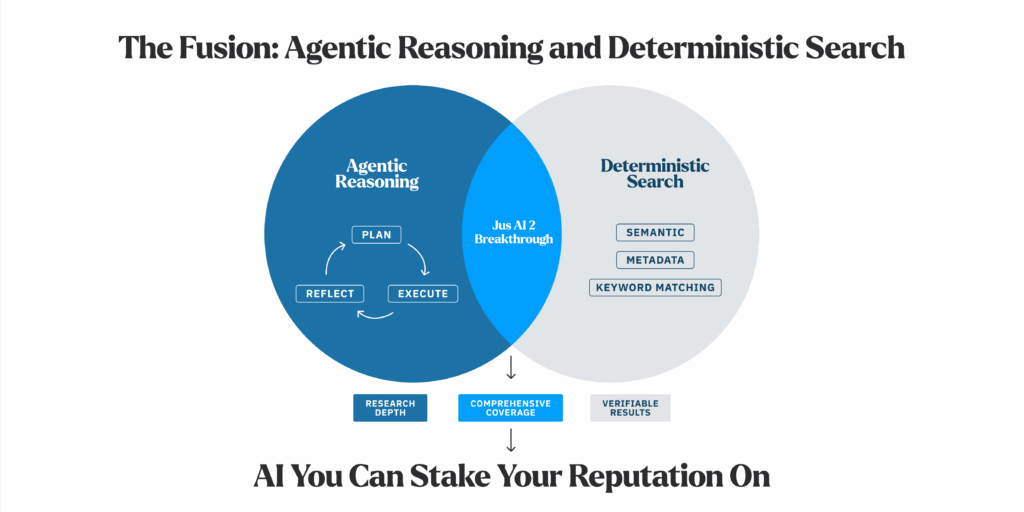THE AUTHOR:
Ayushman Dash, Head of Data and AI at Jus Mundi
A few months ago, we shared how Jus AI was evolving to meet arbitration’s toughest challenges.
With the recent release of Jus AI 2, we sat down again with Ayushman Dash, Head of Data and AI at Jus Mundi, to understand why and how that evolution is a breakthrough in legal research – delivering on our promise of building the best research experience ever created for arbitration lawyers.
Jus AI 1 was already trusted by leading teams worldwide. What did you see as the next frontier to push even further?
With Jus AI 1, we demonstrated that large language models could support arbitration research, and we proved speed and usability. But the challenge was persistent across legal AI: models are probabilistic by nature, but arbitration requires deterministic confidence. If a relevant source exists in the database, it must be found, analyzed, and cited.
Generic legal AI tools face fundamental limitations in arbitration contexts. They do not guarantee citation accuracy, enforce domain-specific ontologies (like seats, institutions, or treaty articles), and neither manage recall (the ability to retrieve all relevant documents) at scale, but arbitration needed structured reasoning tied to an authoritative corpus. Without that, arbitration professionals risk fast but shallow answers that can’t stand up to tribunal scrutiny.
The next frontier was completeness and reliability. Arbitration lawyers don’t just want a “good enough” summary; they want assurance that the AI hasn’t skipped a precedent buried in 100,000+ cases. Jus AI 2 is about solving scale and depth simultaneously, ensuring that even rare or obscure decisions are retrieved and integrated into the reasoning.
When you talk about building “the best research experience ever created for arbitration lawyers”, what does that mean to you?
It means giving lawyers an environment where every answer is both comprehensive and auditable. For example: if a lawyer asks about enforcement of awards under the New York Convention, Jus AI 2 won’t just summarize, it shows the precise cases, rules, and commentary it relied on, with citations that can be clicked and verified. The “best experience” is one where the AI behaves like a diligent associate: fast, transparent, and incapable of hiding its reasoning.
What makes Jus AI 2 a real breakthrough?
Jus AI 2 represents a unique fusion of agentic reasoning – AI that thinks arbitration – with deterministic search that ensures every source is accounted for, giving you complete control. It reasons like you do and proves it with every step, every source, with full transparency.
We engineered Jus AI 2 with hybrid retrieval – semantic embeddings plus metadata filters plus keyword matching – and a verification loop. This closes the gap between probabilistic reasoning and deterministic legal standards.
Why did you decide to fuse agentic reasoning with deterministic search – and why is that combination so powerful?

Agentic reasoning gives structure. The AI decomposes a complex legal query into sub-tasks (jurisdiction, applicable law, precedents, commentary), evaluates each, and reflects before concluding. But reasoning without guaranteed data coverage risks blind spots. Deterministic search ensures that each sub-task retrieves all relevant material from our database, with no shortcuts. Together, you get the creativity of reasoning and the certainty of exhaustive evidence.
What kind of testing protocols did you put in place to ensure Jus AI 2 delivers reliable, verifiable results?
We built a layered QA framework:
- Automated benchmarks with thousands of arbitration-style queries measured for recall, precision, and citation fidelity.
- Human validation where arbitration lawyers review answers for legal soundness, not just surface accuracy.
- Regression testing where every new model or retrieval tweak is run against a gold-standard set of queries to ensure no degradation.
- Continuous monitoring with live performance dashboards tracking citation validity and recall across modes.
This framework creates a feedback loop where the system improves weekly. You can learn more about our comprehensive QA methodology in our recent whitepaper published in collaboration with Stanford CodeX.
What does this update mean for the users in practice?
Jus AI 2 delivers four key benefits to our users. Each represents a fundamental shift from hoping AI gets it right to knowing it delivers what you need:
- Domain mastery: built on Jus Mundi’s comprehensive arbitration corpus, including awards, treaties, and rules.
- Transparency: step-by-step reasoning and citations, so lawyers can inspect the logic.
- Control: users define scope (jurisdiction, treaty, time period), ensuring no irrelevant noise.
- Verification: every source is traceable to the database, eliminating “phantom” citations.
This isn’t just an incremental release. The combination of structured planning, deterministic grounding, and transparent validation makes Jus AI 2 less of an “update” and more of a new standard for how arbitration research should be done.
See Jus AI 2 in Action
Join one of our Jus AI 2 Introduction Webinars to see the breakthrough in action, or Book a Demo for a tailored tour of how Jus AI 2 transforms your research experience.
About Jus Mundi
Founded in 2019 and recognized as a mission-led company, Jus Mundi is a pioneer in the legal technology industry dedicated to powering global justice through artificial intelligence. Headquartered in Paris, with additional offices in New York, London and Singapore. Jus Mundi serves over 150,000 users from law firms, multinational corporations, governmental bodies, and academic institutions in more than 80 countries. Through its proprietary AI technology, Jus Mundi provides global legal intelligence, data-driven arbitration professional selection, and business development services.
Press Contact
Helene Maïo, Senior Digital Marketing Manager, Jus Mundi – [email protected]






